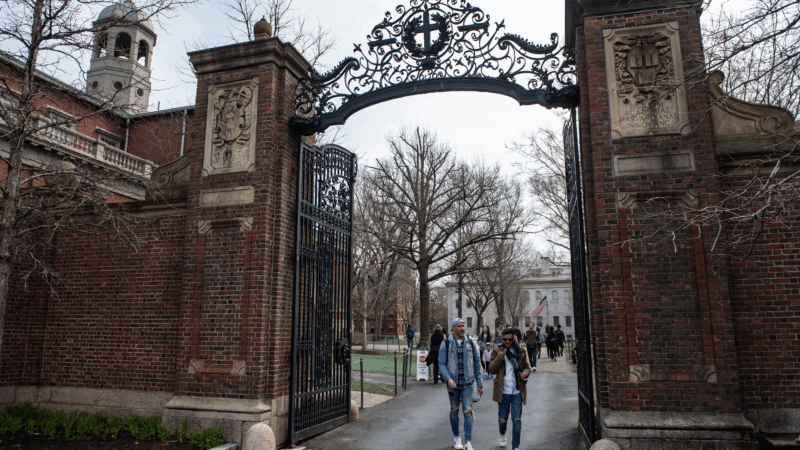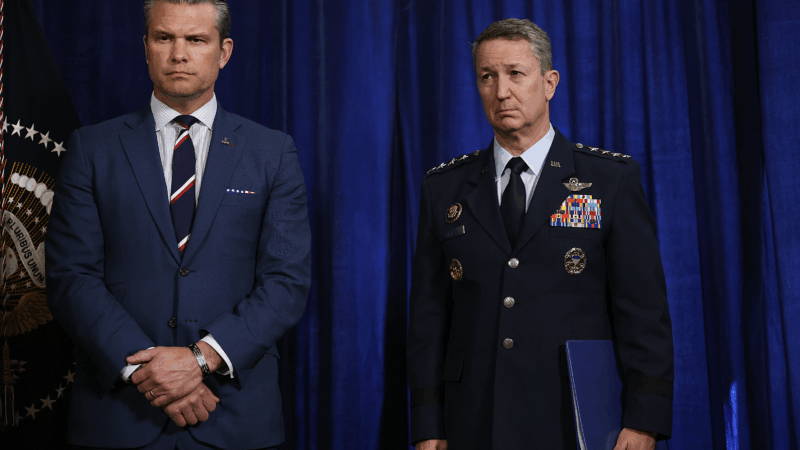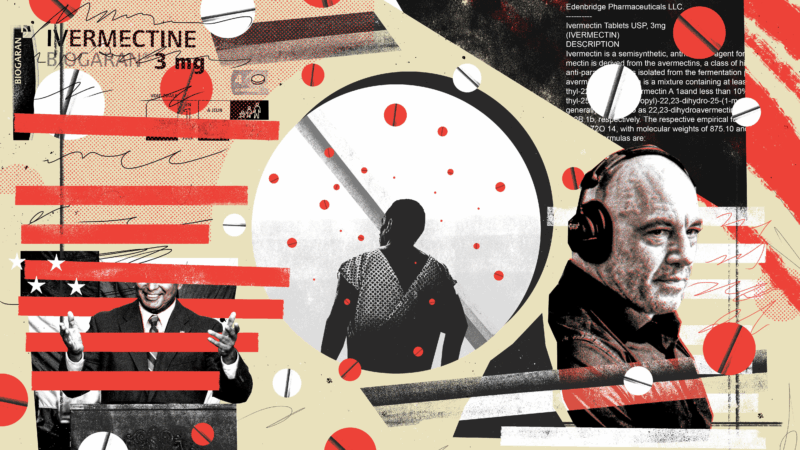Harvard professor gives perspective on the Trump administration clash with university
Despite President Trump’s threats, Harvard University is standing its ground against the administration’s demands.
Within days the Trump administration has cut over $2 billion in federal funding for the university and threatened to revoke its tax-exempt status.
Nikolas Bowie, a professor at Harvard Law, stands with the university’s decision. He says it’s important for institutions to determine what is taught on their campuses.
“For us to change what we think is important, because of prevailing orthodoxy in the White House, would turn Harvard’s pursuit of truth, its motto, to just pursuit of popular opinion,” Bowie told Morning Edition. “That may be an important role for politicians to take and elected officials, but it’s not the role of academics.”
The administration sent Harvard a list of demands last Friday saying their requirements must be met or the university would risk losing $9 billion in federal funding.
Harvard’s president, Alan Garber, rejected the demands on Monday. Within hours of his response, federal officials announced they would freeze $2.2 billion in grants to Harvard. The next day, Trump took to the social media platform Truth Social and threatened to revoke the school’s tax-exempt status.
Seven out of the $9 billion that Harvard receives from the government goes towards hospitals and medical research, Bowie says. His mother, who had Alzheimer’s disease, was able to participate in Harvard studies to slow the progression of her disease.
“I would be furious to learn that the study was canceled midway because the president stripped the hospital of its federal funding. Yet, that’s what the president right now is proposing,” Bowie said.
“For him to hold that research hostage is frankly appalling,” he added.
The White House maintains that its actions are aimed at combating antisemitism on college campuses. Though Trump has vowed to go after colleges and universities he deems as left leaning or too liberal for years. In the last month, the administration has canceled about $11 billion in federal grants at several prestigious universities.
NPR’s Michel Martin spoke to Bowie about how federal funding cuts will impact Harvard.
The following interview has been edited for length and clarity.
Interview highlights
Michel Martin: I noticed that the university is highlighting its research projects. Is one of the threatened projects about Alzheimer’s disease, ALS and things of that sort?
Nikolas Bowie: That’s exactly right. So, right now the sciences and medical research at Harvard is directly impacted by federal funding, but pretty much everything that Harvard does is in some way related to the federal government.
When I was a law student, I learned law from the International Human Rights Clinic at Harvard. The demand letter last Friday took aim at that particular clinic. I can’t imagine why, but I suspect that one reason is because the Trump administration doesn’t like the legal positions it’s articulating.
I think it represents a threat to all of us at the university that no matter what we’re researching or studying, if it happens to not meet the desires of the Trump administration, we could find ourselves in the crosshairs.
Martin: One of the criticisms that the Trump administration has leveled at Harvard is that there has not been adequate viewpoint diversity, meaning that there are not enough conservative viewpoints represented on the faculty.
In Harvard’s response on Monday, it said it had already made major changes over the last 15 months to devote resources to programs that promote ideological diversity. So, isn’t that in some way an admission that the Trump administration had a point there?
Bowie: I think that it’s important that faculty and administrators determine what is taught at Harvard and other universities. For us to change what we think is important because of prevailing orthodoxy in the White House would turn Harvard’s pursuit of truth, its motto, into just pursuit of popular opinion. That may be an important role for politicians to take and elected officials, but it’s not the role of academics.
Our job is to gain wisdom and understanding. And of course, that requires bringing in diverse viewpoints. And, of course, having conservative and other colleagues who can participate in these conversations is critical, but it shouldn’t be done at the point of a financial gun.
Martin: There are two lawsuits that have been filed against the administration, trying to oppose these moves at Harvard. One pertains to immigration enforcement policies targeting non-citizens for expressing pro-Palestine views, which the lawsuit says is a violation of the First Amendment. The other one speaks to these funding freezes.
Do the people who filed these lawsuits feel confident that you may be successful in opposing these changes?
Bowie: Oh, we do. No law in this country permits the president to seize federal funds and to just keep them until an institution complies with his personal will. There’s laws that govern how federal funds are used because they’re used for important things like research.
The Constitution also just prohibits public officials from abusing their power to punish their political enemies. That’s what the president is doing here when he’s deporting students for protesting injustices in Gaza. It doesn’t permit him to punish the rest of the university either for how it disciplines those students.
Transcript:
MICHEL MARTIN, HOST:
So what does this clash between Harvard and the Trump administration look like to people who study, teach, and conduct research at the school? Nikolas Bowie has both a law degree and a doctorate in history from Harvard and is now a law professor there, and he is with us now. Professor Bowie, welcome. Thank you for joining us.
NIKOLAS BOWIE: Thank you.
MARTIN: It would seem clear that the administration, as well as his allies in Congress and elsewhere, had Harvard in its sights. And I’m thinking about that congressional – that very contentious congressional hearing that led to the president being forced out last January. But I was wondering if you and other faculty were surprised in any way by the scale, you know, of the administration’s attack – more than $2 billion in funding being frozen, demanding to oversee academic departments, this – and, you know, now this threat to revoke the tax-exempt status.
BOWIE: Yeah, I am. You know, my mother had Alzheimer’s disease. And every month, I drove her to Brigham and Women’s Hospital, which is a Harvard affiliate, so she could participate in a study about slowing the progression of her disease. And I would be furious to learn that the study was canceled midway because the president stripped the hospital of its federal funding, yet that’s what the president right now is proposing. Seven out of $9 billion that Harvard receives from the government goes towards hospitals and medical research, and so for him to hold that research hostage is, frankly, appalling.
MARTIN: So I noticed that the university, on its website, is highlighting its research projects. Is one of the threatened projects about Alzheimer’s disease and ALS and things of that sort?
BOWIE: Yeah. That’s exactly right. So right now the sciences and medical research at Harvard is directly impacted by federal funding, but pretty much everything that Harvard does is in some way related to the federal government. When I was a law student, I learned law from the International Human Rights Clinic at Harvard. And it took on powerful opponents like Shell or foreign countries to hold them accountable and ensure that they were adhering to international law. The demand letter last Friday took aim at that particular clinic. I can’t imagine why, but I suspect that one reason is because the Trump administration doesn’t like the legal positions it’s articulating. And so I think it represents a threat to all of us at the university that no matter what we’re researching or studying, if it happens to not meet, you know, the desires of the Trump administration, we could find ourselves in the crosshairs.
MARTIN: So one of the criticisms the Trump administration has leveled at Harvard is that there has not been adequate viewpoint diversity, meaning that there are not enough, or fewer, conservative viewpoints represented on the faculty and in the teaching and so forth. In Harvard’s response on Monday, it said it had already made major changes over the last 15 months to devote resources to programs that promote ideological diversity. So isn’t that, in some way, an admission that the Trump administration had a point there?
BOWIE: I think that it’s important that faculty and administrators determine what is taught at Harvard and other universities. For us to change what we think is important because of prevailing orthodoxy in the White House would turn Harvard’s pursuit of truth, its motto of Veritas, into just pursuit of popular opinion. That may be an important role for politicians to take, and elected officials, but it’s not the role of academics. Our job is to, you know, gain wisdom and understanding. And of course, that requires bringing in diverse viewpoints. And of course, having conservative and other colleagues who can participate in these conversations is critical. But it shouldn’t be done at the point of a financial gun.
MARTIN: So you have expertise in constitutional law. And I want to note that there have been – and my colleague Elissa Nadworny noted that there are – two lawsuits that have been filed against the administration are, you know, trying to oppose these moves at Harvard. One pertains to enforcement – immigration enforcement policies targeting noncitizens for expressing pro-Palestine views, which the lawsuit says is a violation of the First Amendment. The other one speaks to these funding freezes. As briefly as you can, does the administration, or do the people who file these lawsuits, feel confident that you may be successful in opposing these changes?
BOWIE: We do. You know, no law in this country permits the president to seize federal funds and to just keep them until an institution complies with his personal will. You know, there’s laws that govern how federal funds are used because they’re used for important things, like research. The Constitution also just prohibits public officials from abusing their power to punish their political enemies. That’s what the president is doing here when he’s deporting students for protesting injustices in Gaza. That’s what he’s – with – and then – it doesn’t permit him to punish the rest of the university, either, for how it disciplined those students.
MARTIN: That’s Nikolas Bowie. He’s Louis D. Brandeis Professor of Law at Harvard Law School. Professor Bowie, thank you so much for joining us.
BOWIE: Thank you for having me.
Some Middle East flights resume, but thousands of travelers are still stranded by war
Limited flights out of the Middle East resumed on Monday. But hundreds of thousands of travelers are still stranded in the region after attacks on Iran by the U.S. and Israel.
‘Hamnet’ star Jessie Buckley looks for the ‘shadowy bits’ of her characters
Buckley has been nominated for a best actress Oscar for her portrayal of William Shakespeare's wife in Hamnet. The film "brought me into this next chapter of my life as a mother," Buckley says.
How, who, and why: NPR flips its famous letters to defend the right to be curious
NPR is standing up for the public's right to ask hard questions in a national campaign dubbed "For your right to be curious." At NPR's headquarters, on billboards in New York City, Chicago, and Washington, D.C., and across social media, NPR's three iconic letters transform into "how," "who," and "why" — a bold declaration of its commitment to fight for Americans' right to ask questions both big and small.
Hegseth: ‘We didn’t start this war but under President Trump we’re finishing it’
The remarks are the first to reporters since the U.S.-Israeli military operations against Iran began Saturday despite weeks of talks designed to stave off a conflict.
Ivermectin is making a post-pandemic comeback, among cancer patients
The anti-parasitic drug became a household name during the COVID-19 pandemic, and it is now being embraced as an alternative treatment for cancer. It is as politically polarizing as ever.
Rep. Adam Smith on the U.S. strikes on Iran and the debate over Trump’s war powers
NPR's Leila Fadel asks Democratic Rep. Adam Smith of Washington, the ranking member on the House Armed Services Committee, about President Trump's unilateral authorization to strike Iran.







